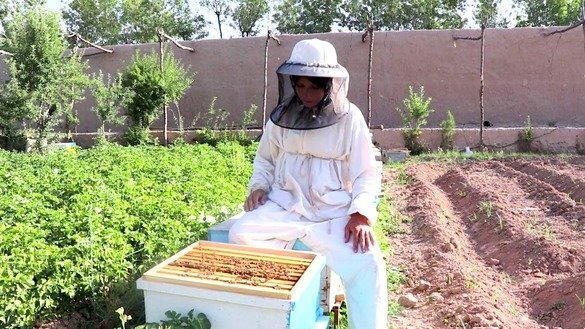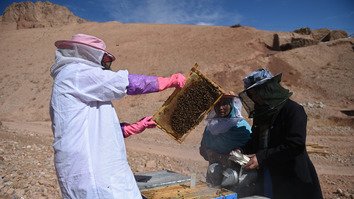HERAT -- Three times a week, Ghuncha Gul Karimi and her six-year-old daughter walk about a kilometre from their home in Injil District of Herat Province to visit bees. Her bees.
Karimi dabbled as a beekeeper for the past eight years at her home before finally realising her dream of opening up her own apiary this year. Her success highlights the progress and initiative of Afghan women in contributing to the economy while taking steps to improve their family financial situations after years of suppression by the former Taliban regime.
"For seven long years, I kept my bees on my house's rooftop, and this year I brought them to a garden for the first time," Karimi told Salaam Times. "I love bees, and I want to continue to progress in my business."
"I now manage my whole life on my own," she said. "My economic situation has changed since I started my business."

In a screenshot from a Salaam Times video, Ghuncha Gul Karimi checks on her bees in a garden near her house in Injil District, Herat Province, December 6.
![Ghuncha Gul Karimi and her six-year-old daughter can be seen February 9 as she displayed honey produced by her bees at an exhibition in Herat city February 9. [Omar]](/cnmi_st/images/2019/03/04/16962-a_3-585_329.jpg)
Ghuncha Gul Karimi and her six-year-old daughter can be seen February 9 as she displayed honey produced by her bees at an exhibition in Herat city February 9. [Omar]
Karimi, who was previously a housewife, says she has numerous customers and that her success has ensured her financial credibility in the market. That means she now can borrow easily to expand her business.
"I didn't even have as much as 1,000 AFN ($13) to my name when I started my beekeeping business," she told Salaam Times. "In the beginning, I borrowed a beehive from my employer. Later on, I paid him back what I borrowed and bought myself a beehive using the profit" from sales of honey products, she said.
Empowering women
More Afghan women are turning to beekeeping as a profession because it requires little investment -- less than 100,000 AFN ($1,324), according to beekeepers, including Karimi. Most female beekeepers have started from scratch but have been able to expand their businesses, while earning income for their families.
Her business is doing well and she has 19 beehives, said Karimi. Still, even with the end of Taliban rule, many obstacles confront women who want to enter business arenas traditionally dominated by men.
"I faced strong opposition from my family and community during the first days of my career, mainly due to the traditional nature of our society," she said. "Others hoped that I would end up abandoning my beekeeping. Nevertheless, I ignored all those problems and continued with my work."
"We are not going to succeed or improve if we listen to what others say," Karimi said. "They create so many barriers for women, but I ignore them all."
Nafisa Danish is another female beekeeper in Herat Province with a thriving honey business.
"I've been in the beekeeping business for three years, and I sell honey on the market," she told Salaam Times. "I began my work with very little start-up capital. I didn't let fear overwhelm me, for I believe that we should not be afraid if we want to achieve our objectives. I started from the rock bottom. Now I'm doing well, and my economic situation has improved considerably."
Support from the government
In past 15 years the Afghan government has sought to support women's empowerment and their involvement in Afghanistan's economy. Their involvement in agriculture in villages and districts, for example, is considered a key factor in sustaining the country's agricultural production.
"The beekeeping sector in Herat Province is a young and developing sector that progresses" every year, Abdul Saboor Rahmani, the director of Herat Province's Agriculture Department, told Salaam Times. "We have more than 100 female beekeepers" in the region "who play an important role in honey production".
"Through the provision of opportunities to beekeepers and by helping them, the Ministry of Agriculture is trying to increase the amount of honey production in Herat Province," he said. "We provide them with the necessary equipment and facilities. We have decided to distribute beehives to 200 families in Herat Province in order to give them financial support as well as honey-production capability."
With the increase of honey production in Herat Province, imports from Iran to the province have slowed, he added.
"Honey produced by female beekeepers in the Province of Herat is of good quality; therefore, customers do not use low-quality Iranian honey," he said.
"We hope that in the near future, our honey will become the rival of honey produced by the neighbouring country, completely eliminating honey importation" from Iran, Rahmani said. "According to our information, almost 100 tonnes of honey has been produced in Herat Province this year, which means more than a 20-tonne increase compared with the previous year."
Progress for women
The success of these beekeepers in the province is proof of women's progress in Afghan society, said Jilani Farhad, spokesman for the Herat governor.
"The Afghan government has always prepared the ground for the growth and development of women's professional and social life," Farhad told Salaam Times. "There exists a proper" support structure "for the advancement of women who are active in such sectors as industry and agriculture, where they are provided with all necessary facilities and equipment, as well as all other kinds of help and support that they need."
"The policy of the Afghan government is to provide equal opportunities for women and men alike, in order to illuminate Afghanistan's path towards development and self-sufficiency," he added. "We are utilising all we can within our power to improve women's work situation in Herat Province."







